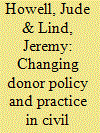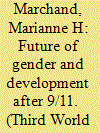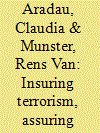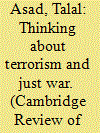| Srl | Item |
| 1 |
ID:
090715


|
|
|
|
|
| Publication |
2009.
|
| Summary/Abstract |
This article argues that the global 'War on Terror' regime has contributed in complex and differentiated ways to the increasing securitisation of development policy and practice. The global 'War on Terror' regime refers to a complex and contradictory weaving of discourses, political alliances, policy and legislative changes, institutional arrangements and practices. This is manifest in aid rhetoric, policy discourse, institutional convergence and programming. These processes have in turn affected the way donor agencies engage with non-governmental actors. On the one hand they have led to new forms of control over charitable agencies; on the other hand they have created new opportunities for interaction and resource access to 'newly discovered' civil society actors such as Muslim organisations and communities. The article explores these issues through the lens of development policy and practice by four donor countries, namely, the USA, Sweden, the UK and Australia.
|
|
|
|
|
|
|
|
|
|
|
|
|
|
|
|
| 2 |
ID:
090727


|
|
|
|
|
| Publication |
2009.
|
| Summary/Abstract |
This paper draws on interviews conducted in the days and weeks after the events of September 11th, 2001, analyzing the transition from "September 11th, 2001" to "9-11." That is, from the discursive void that immediately followed the acts of terrorism in New York, Virginia and Pennsylvania to the apparently self-evident crisis that the events came to represent in the following days and weeks. First, the paper redresses persistent oversights of discourse-oriented work by recognizing and investigating both the agency of the US general public and the context that official responses were articulated in. Second, the paper serves to denaturalize the construction of 9-11 as crisis, questioning the first and pre-requisite stage of the emerging discourse of the "War on Terror." Theorizing void, crisis and their relationship enables an understanding of how the War on Terror was possible and opens a critical space for its contestation.
|
|
|
|
|
|
|
|
|
|
|
|
|
|
|
|
| 3 |
ID:
089231


|
|
|
|
|
| Publication |
2009.
|
| Summary/Abstract |
The area of gender and development has been a site of critical contributions to the field of development studies and has been characterised as bridging practice, policy and theory. Since the policy of gender mainstreaming has been accepted, however, much of the originality and issues raised by the gender and development field have been marginalised and excluded from the development (policy) agenda. Some even argue that gender has been written out of the post- 9/11 development agenda thanks to the new global security regime. This article goes beyond these debates and suggests new ways of thinking about gender and development. Instead of arguing that it is 'dead', I argue that it is the site of innovative and critical thinking about development issues in a transformed and globalised world. The starting point for my argument is the insights provided by postcolonial feminism and transnationalism. While the former has contributed to feminist theorising through such concepts as representation, 'othering' and the silencing of Third World women's voices, the latter helps us understand new global realities resulting from migrations and the creation of transnational communities.
|
|
|
|
|
|
|
|
|
|
|
|
|
|
|
|
| 4 |
ID:
084696


|
|
|
| 5 |
ID:
090723


|
|
|
| 6 |
ID:
094553


|
|
|
|
|
| Publication |
2010.
|
| Summary/Abstract |
Since 2001 a new urge to moralize the use of violence as an instrument of state policy has appeared in liberal democracies. The American idea of a War against Terror, and the European notion of confronting a global terrorist threat, have together merged with a discourse on humanitarian military action: the political/moral 'responsibility to protect' is no longer to be confined to one's own citizens. Renewed interest among academics in 'just war' theory, the tradition that seeks to humanize war through law, reflects this development. This article questions the assumption that there is an essential difference between war (civilized violence) and terrorism (barbaric violence). It argues that their similarity appears more clearly if we set intentions aside-such as the deliberate or accidental killing of 'innocents'-and focus instead on three main facts: (a) modern war strategies and technologies are uniquely destructive, (b) armed hostilities increasingly occupy a single space of violence in which war and peace are not clearly demarcated, and (c) the law of war does not provide a set of 'civilizing' rules but a language for legal/moral argument in which the use of punitive violence is itself a central semantic element.
|
|
|
|
|
|
|
|
|
|
|
|
|
|
|
|